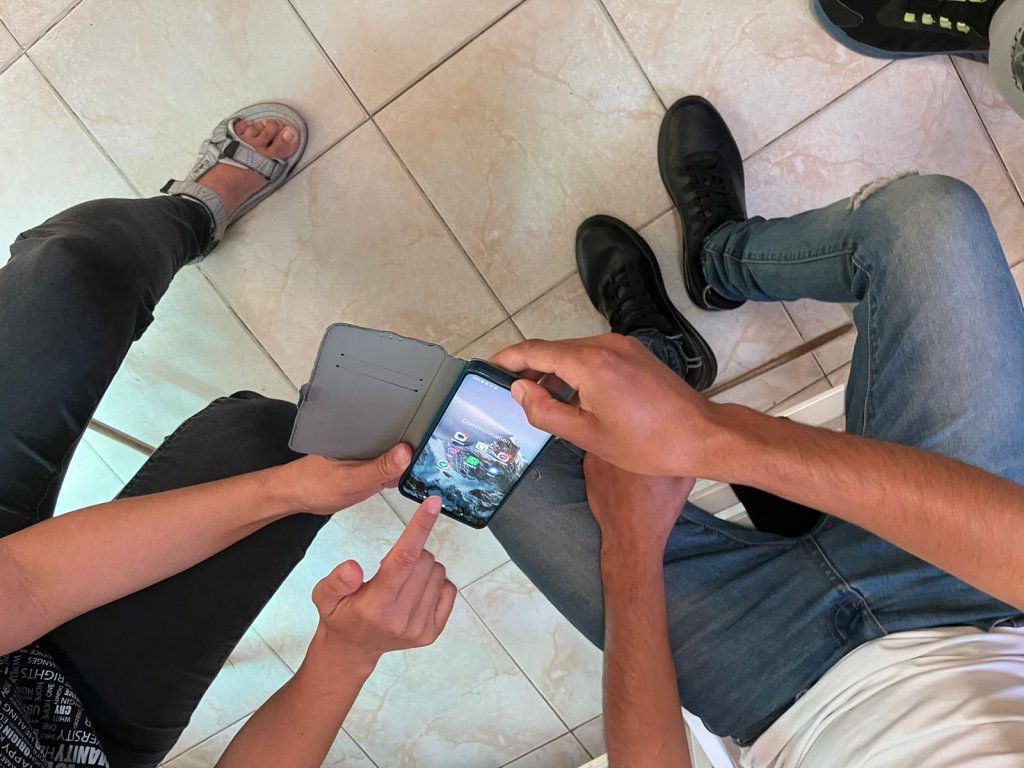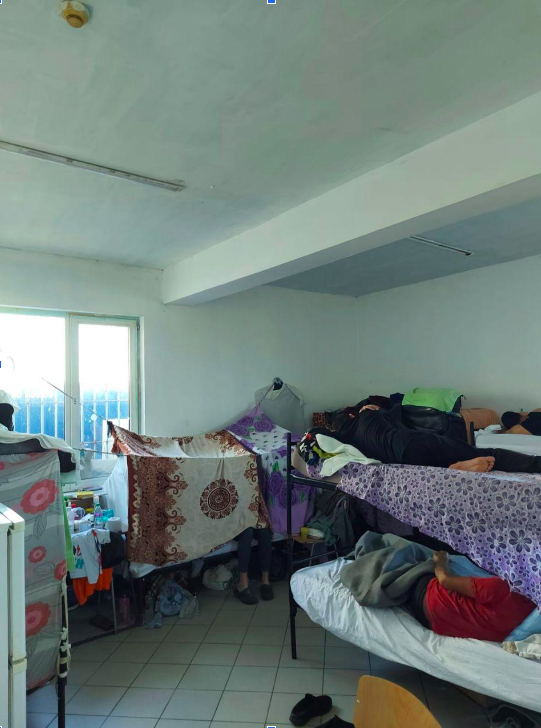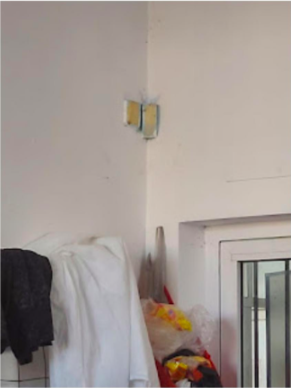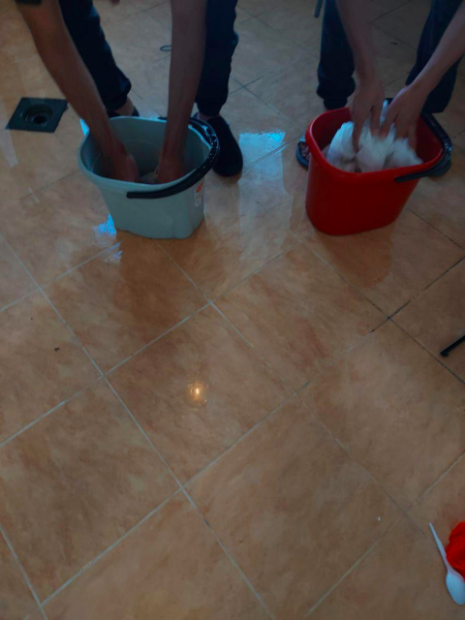Migrants describe daily life in Bulgarian detention centers as brutal, characterized by restricted access to phones, unsanitary conditions and 24-hour surveillance.
Osman leaned back against his chair with his arms crossed, observing everything. He opened his black eyes, visible from underneath a baseball hat of the same color, very wide whenever he spoke. "It’s funny, every time I say something, you write it down. As if I were someone important," he said.
The 25-year-old Syrian had just obtained subsidiary protection from the Bulgarian state after a long process. The young man had been arrested seven months ago in Sofia while he was in an irregular situation and trying to leave the country to reach the Netherlands. He was placed in the Lubimets detention center, in southern Bulgaria, and released 13 days later, only after he declared himself and was registered as an asylum seeker.
"Inside, it’s terrible; with insects everywhere. I couldn't sleep because I have a phobia of dirtiness. Also, the police beat us, this happened to me four or five times during those 13 days," he claimed.
Migrants have very limited access to their phones in the detention centers – only a few minutes per week in theory. Yet in practice, it's different. "I had no possibility of having my phone," said Osman. "My family was very worried because they had no news from me and they thought I was dead. Those 13 days seemed like 30 years."

Asylum requests registered in detention
Lubimets is one of two immigration detention centers in Bulgaria. Busmantsi is the second one, located on the outskirts of Sofia. Sohrab, a 25-year-old Afghan met in the streets of the capital, spent 14 days in the second. “The conditions there were deplorable, with more than 20 people in one room,” he said. He too was released by submitting an asylum request.
A third closed center exists in Elhovo, near the Turkish border. The Bulgarian government at the end of 2022 "officially designated Elhovo detention center to serve "as a transit centre for re-distribution of newly arrived Ukrainian refugees despite its utterly unsuitable conditions," reported the European Council on Refugees and Exiles.

Migrants in irregular situations who are arrested can register as asylum seekers at Lubimets or Busmantsi, as Osman and Sohrab did. They are then released in several days, two weeks maximum, before going to accommodation centers open and reserved for this kind of public.
Therefore it is possible to find asylum seekers in detention centers under the authority of the State Refugee Agency. Yet the majority of individuals are the ones whose cases have been rejected and who are subject to a procedure of return to their country of origin. While some are still appealing, others have exhausted all possible legal options.
Also read: Conditions at UK detention center underscore mental health issues migrants face
Six to 18 months of detention
"The problem is that many rejected people, such as Afghans or Syrians, cannot be expelled," said Victor Lilov, member of the Bulgarian Helsinki Committee. This is due to the lack of diplomatic channels to obtain consular passes between Bulgaria and the governments in place in these countries. "There is therefore no reason to keep them locked up like this," he added. Bulgarian law states that confinement can only last for a maximum period of six months.
Yet for certain individuals, this period is renewed for up to 18 months. These individuals are most of the time considered threats to public order and they fall under the responsibility of the State Agency for National Security. To justify their decision, the agency "produces blank notes [secret information reports filled out by the police or intelligence services, editor's note], without us being able to know the argument," said Lilov.
"I know a Syrian who has been in detention for a year and a half, he was rejected from asylum, after fleeing military service in Syria from the Assad regime," said the human rights defender. In 18 months of detention, "his lawyer never had access to this note. He does not know what his client has been accused of, nor how to defend him accordingly."
Also read: IOM: thousands of migrants suffering in Libya detention centers
‘24-hour’ surveillance of detainees in Busmantsi
In an extreme case that has drawn the attention of human rights groups, the Saudi human rights and political activist Abdulrahman Al-Khalidi has been detained in Busmantsi since October 2021. "I don’t know anyone who stayed in a closed center for so long. He has done nothing except ask for asylum," said Lilov.
The Bulgarian justice system on June 5 once again rejected Al-Khalidi’s request for release. Since he was refused asylum in Bulgaria at the end of 2021, the young man has remained in detention in Busmantsi, due to a series of legal twists and turns. He has remained under the threat of deportation to Saudi Arabia for two and a half years, an event that would expose him to serious risk of arrest, torture, and other human rights violations, as many non-governmental organizations (NGOs) have warned.

Busmantsi has all the characteristics of a "high surveillance prison", wrote Al-Khalidi from his cell via encrypted messaging sent to InfoMigrants. There are "iron doors, the permanent presence of security agents and a lack of freedom of movement inside [as well as] surveillance cameras and electronic listening equipment in the rooms which are active 24 hours a day and 7 days a week."
Al-Khalidi as well as several other sources said that the rooms are locked between 10 pm and 7 am, with access to the bathroom thus impossible. Inmates are forced to use empty water containers or bottles to relieve themselves at night.
Providing photos to InfoMigrants as proof, Al-Khalidi also claimed that the meals served in the detention centers were insufficient, with sometimes only one served per day. Migrants are also plagued by insects, including bedbugs, which cause skin diseases, he said.
In addition, detainees are denied access to washing machines and dryers: "We have to wash our clothes manually all the time, sometimes in sub-zero temperatures in winter."

Last April, Human Rights Watch condemned a beating suffered by the Saudi at the hands of agents of the center, demanding an investigation to be opened.
When questioned about this violent incidence, and more generally about the living conditions described in the comments and photos collected by InfoMigrants, the Ministry of the Interior and the State Agency for Refugees have not yet provided any answers.
'I have been deprived of most of my basic human rights'
Fragilized from his months in detention, Al-Khalidi regretted the lack of medical and psychological follow-up, even after he attempted suicide in November 2022. “My depression has reached a peak [in recent months], and my thoughts of self-harm are coming back to me stronger than ever before,” he said.
The Saudi claimed to have written several letters requesting "psychological care" to the State Agency for Refugees and the police services. Yet it was in vain. "I only had one visit with a psychologist,” he said. In this immigration detention center, “I have been deprived of most of my basic human rights; [rights normally] protected by international and European laws," said Al-Khalidi.
Also read: Polish detention centers reportedly harm some migrants' mental health
